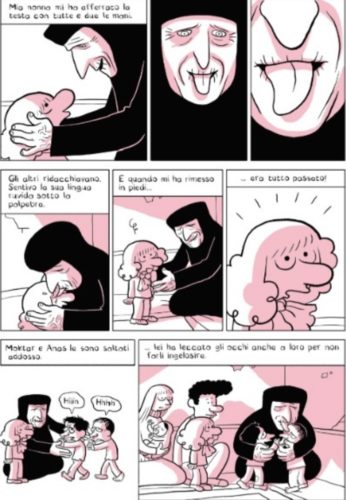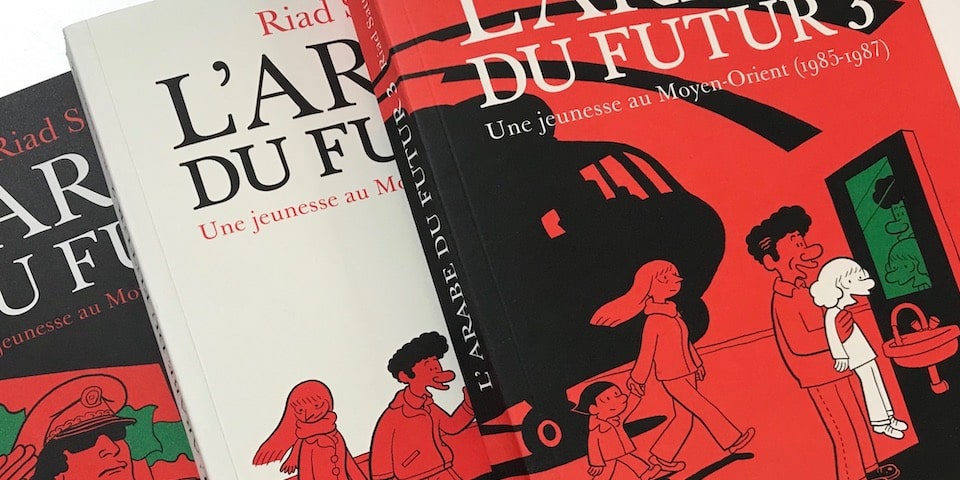The Arab of the Future, a wonderful graphic memoir
The Arab of the Future, the graphic memoir of Riad Sattouf, is a feast for the eyes and the heart.
I practice Linguistic Empathy and I expect you to do the same. Please bear with me if my English is not perfect.
A while ago a French friend of mine came to visit me in Geneva. She was reading The Arab of the Future, a graphic novel she highly recommended. I decided to read it in French, despite finding the language of Proust a bit heavy to follow in its written form.
I did not regret it. Reading The Arab of the Future in its original language added authenticity to a story that feels true from the very beginning. And what a story it is! Riad Sattouf was born in France in the ’80s to a French mother and a Syrian father, a professor at the Sorbonne. In the first four books we see him living in Libya, Syria, and finally going back to France, with occasional visits to the Syrian village his father is from.
Riad’s story talks about themes that are very dear to my heart. Relocating abroad, first of all. We observe how different going to live in the Middle East is for each member of the family. For the little child with blonde curly hair, of course, but also for his mother, following her husband in such a complex place, or for his father, an Arabist who is so happy to bring the family in the cultural environment where he grew up and of which he is so proud.
 The other captivating topic of the memoir is the constant negotiation between the two different identities of the parents in an unknown environment for Riad. The continuous shifting of points of view is fascinating and shows us so many different perspectives. We get to know Syria at that time through the eyes of little Riad, who looks at things with surprise and no judgment, without grasping the “why” – for instance why he is always contemptuously called “Jewish” by his peers.
The other captivating topic of the memoir is the constant negotiation between the two different identities of the parents in an unknown environment for Riad. The continuous shifting of points of view is fascinating and shows us so many different perspectives. We get to know Syria at that time through the eyes of little Riad, who looks at things with surprise and no judgment, without grasping the “why” – for instance why he is always contemptuously called “Jewish” by his peers.
The way he uses his experience in relating to cousins, classmates, teacher and adults of the family to introduce us to the Syrian culture is hilarious. At the same time, we are touched by the suffering of a child who has to adapt to a totally new life, while physically standing out so clearly, thus awakening stereotypes and discrimination.
The parents also contribute to show how this relocation weighs on the relationships of the whole family. Little Riad is confused in front of his mother’s reactions to her husband’s country, and his father relationship with France. It is however thanks to this utter confusion that we grasp the whole complexity of the encounter between two different identities, and the molding of new ones. Riad looks at Libya, France and Syria with non-judgemental curiosity, and in doing so he shares an absolutely genuine and spontaneous interpretation of his reality, which leaves space to irony and laughter.
All this despite the rather tragic moments he goes through, starting from the bullying he is subjected to by his peers and the harsh treatment of some teachers, up to definitely more serious issues, concentrated in the fourth book.
I am not very fond of comics, but I have been completely charmed by the simple but captivating graphic style of Sattouf, who creates amazing characters and adapts them to the passing of time and the changing of circumstances, so as to keep them always genuine, lively. The Syrian grandmother is absolutely fantastic, and the part where she uses her tongue to give relief to Riad’s red eye is sublime.
I warmly suggest this memoir to all those interested in lives that connect to different cultures and in what our children go through when they relocate, but also to whomever wants to discover new paths of life and be touched by endless tenderness.

